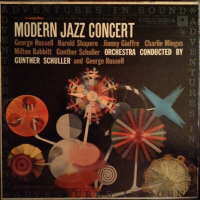Milton Babbitt, crabby, exuberant, reviled, playful, rigorous, thrilling. The composer who has been among the most controversial yet influential figures in American concert music of the past 60 years. The theorist whose vision about the direction that music should take dominated the academy for decades. The teacher who has guided generations of young composers both at The Juilliard School and in the Ivy League. The man who, as he celebrates his 90th year, continues to lead a full life as a composer and pedagogue, and who glows at the thought that James Levine, one of his most powerful champions, is now in command at the Boston Symphony.
In person, Milton Babbitt is a small, compact figure whose pursed lips and twinkling eyes behind thick black frames seem always on the edge of a smile. His conversation is quick, his thought fluid, able to dart from one subject to another at the drop of an implication. Just like his music, some might say. Joel Sachs, a Juillliard colleague for many years, makes the comparison directly.
Sachs describes an occasion when he played one of Babbitt's piano compositions at the Dartington Summer Festival in England. "Milton was there," Sachs recalled, "always at the lunch and dinner tables, always gabby, very friendly, very funny." At the recital, Sachs told the audience that one way to "get" Babbitt's music is to think of it as "being like a conversation" with the composer. After the concert, an elderly woman came up to Sachs and said, "Thinking of the conversations with him made all the difference."
"If performers can present his music as conversation that goes by very quickly and very naturally," Sachs said, "that can make a difference."
Gabby playfulness is not the image most concertgoers have of Milton Babbitt, if they have any image at all. Those with some knowledge of music history might recall the February 1958 essay from High Fidelity magazine with the unfortunate��"and inaccurate��"headline, "Who Cares If You Listen?" That was not Babbitt's choice; he says he would have preferred "The Composer as Specialist."
But the argument of the essay, written in a style that is simultaneously precise and convoluted, was that composers of "serious," "advanced" music should retreat into the cloisters of the academic world. Only there, Babbitt contended, among colleagues in such disciplines as physics, mathematics, and analytic philosophy, could they pursue the creation of work that very few in the outside world would be expected to understand.
Read more
Born in Jackson, Miss., in 1916, as a child Babbitt was both musical and mathematical. The interest in numbers came from his father, who was an actuary. The interest in music was eclectic. He studied piano, clarinet, and saxophone, and by the time he graduated from high school he was already playing jazz and popular songs.
When he entered college, Babbitt's first impulse was to study math at the University of Pennsylvania, but he quickly switched to music, studying with Marion Bauer and Philip James at N.Y.U., and later studied privately with Roger Sessions. He did graduate work at Princeton, and continued to divide his time between music and mathematics. Although Babbitt's intellectual bent was toward the mathematical side of music (in 1946 he wrote a paper on "The Function of Set Structure in the Twelve-Tone System"), he didn't give up on pops, with some film scores and an unsuccessful Broadway musical.
Once he settled in, however, the music Babbitt wrote was meant to be as carefully defined as the most complex experiment of physics or the most elegant mathematical solutions. In his musical universe, expanding on the 12-tone system developed by Arnold Schoenberg, every note of every composition needed to be prescribed not just by pitch, but by other sonic variables including register, dynamics, duration, and timbre.
"It is this high degree of 'determinacy' that most strikingly differentiates such music from, for example, a popular song," Babbitt wrote. This serialism is an example of the extreme reliance on rationality in the high modernism that flowered among certain of the arts after World War II. Babbitt's Three Compositions for Piano, written in 1947, is considered to be the first example of total serialization in music.
This was music that seemed, in its apparent unpredictability, extreme and unexpected leaps in pitch and dynamics, to be almost incomprehensible to the general listener, a fact which Babbitt not only recognized but advocated. "The time has passed," he wrote, "when the normally well-educated man without special preparation could understand the most advanced work in, for example, mathematics, philosophy, and physics. Advanced music, to the extent that it reflects the knowledge and originality of the informed composer, scarcely can be expected to appear more intelligible than these arts and sciences to the person whose musical education usually has been even less extensive than his background in other fields."
Nearly everything that he has written presents such difficulties to listener and performer. From Philomel, an extraordinary work for soprano, recorded soprano, and tape premiered in 1964 using computer-synthesized sound, to Concerti for Orchestra, commissioned and premiered by the Boston Symphony one year ago, Babbitt's music demands extremely concentrated listening, and more than once.
Not only has Babbitt been the exponent of a radical method of writing and analyzing music, he has also been a pioneer in methods of making its sounds. During the late 1950s and '60s he worked extensively with the RCA Mark II Synthesizer at the Columbia-Princeton Electronic Music Center. Not a performance instrument such as the synthesizers used by popular bands today, it was nevertheless the first electronic music synthesizer.
Philomel, written for soprano Bethany Beardslee, is the most famous of his compositions using the synthesizer. Set to a text by the poet John Hollander, it uses the soprano's live voice, her taped voice, and sounds created by the synthesizer to create an alien, disorienting, intense sonic environment.
And, although Babbitt turned away from electronics after the Mark II was vandalized in the 1970s, his music continues to seem disorienting and intense. Yet, despite the complexity of the method by which he writes, and the dense language used to explain it, Babbitt's music is surprisingly transparent, even spare. It is often tender and gentle, and filled with important silences, rather than being harsh, abrupt, and thick.
In his Boston Globe review of Concerti for Orchestra, critic Richard Dyer wrote: "Babbitt's music thrives on the borderline between extreme intellection and extreme emotion. The new piece has all the brainpower of its predecessors within it, but without the bristling density of event. It is music of remarkable transparency of texture, clarity of detail, and spaciousness."
Peter Lieberson compares Babbitt's music to his personality in a way similar to Sachs's assessment: "His mind works very fast. You can hear recalls, subtle references to what happened earlier. It is so subtle that, if you listen to it once it will bypass you. If you listen over and over, while looking at the score, you realize that that kind of association is happening constantly in the music. There are so many of them that it is sometimes difficult to absorb in one listening."
Whatever the theory and impact of his own music, as a teacher Babbitt does not demand stylistic loyalty. On the Juilliard composition faculty since 1971 and at Princeton University's music department from 1938 to 1984 (when he retired and became professor of music, emeritus), he has worked with generations of students who have a remarkable variety of styles. Besides composers such as Lieberson and fellow Juilliard professor Jonathan Dawe, Babbitt's pupils have included Stephen Sondheim, whose music is known for a different sort of complexity. Clearly, he did not impress his own views on their work.
"He never tried to impose himself," Dawe said. "He never tried to spin things in a direction he would think was his esthetic or style. But he had a very strong, intrinsic awareness of your music. In a lesson situation, he does seem to get into a student's music, to get to know it. He was very helpful."
Lieberson had the same experience. "There was no attempt on his part to guide me in a particular direction," he said. "If he was interested in what I was doing, he made himself completely available," even if Babbitt's ideas weren't immediately comprehended.
Babbitt's late wife of 66 years, Sylvia, once told Lieberson, "Milton doesn't want people's music to sound like him, to become like him as a composer."
Viewed from the opposite direction, Babbitt's music is unique. "There are no composers, really, that you can say stylistically sound like Milton Babbitt," Lieberson said. "Nobody sounds like Milton Babbitt." Source: Peter Goodman
Awards
Princeton awarded Babbitt, then 75, a doctorate in 1992, 46 years after his dissertation on the 12-tone system of modern composers was rejected.
“His dissertation was so far ahead of its time it couldn't be properly evaluated at the time," Theodore Ziolkowski, dean of Princeton's graduate school and a close friend of Babbitt, said.
Babbitt received a special Pulitzer citation for his life's work in 1982, won a MacArthur Foundation grant in 1986 and received the Gold Medal of the American Academy and Institute of Arts and Letters in 1988.
Show less












